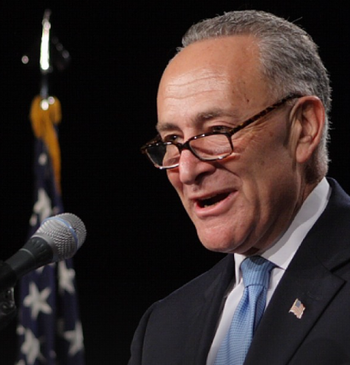
WASHINGTON, DC, July 29, 2022 (ENS) – Two of the Democrats’ most powerful senators have agreed to add a $700 billion climate change, energy security and debt reduction package, the Inflation Reduction Act of 2022, to the Budget Reconciliation bill and vote in the Senate next week.
Senate Majority Leader Chuck Schumer of New York and Senator Joe Manchin of West Virginia announced the agreement jointly on Wednesday evening.
The agreement to pay down $300 billion of the federal deficit, came as a surprise to their Senate colleagues. Less than two weeks ago, the climate and energy talks between Schumer and Manchin dissolved in a pool of disagreement.
Manchin told reporters the talks broke down because he did not support a large tax and climate bill after a report from the Bureau of Labor Statistics showing that consumer prices surged in June at their highest pace in 40 years, increasing at an annual rate of 9.1 percent as gasoline and food prices drove inflation to record levels.
But the two senators appear to have found a way to bring down inflation and curb climate change simultaneously.
“After many months of negotiations, we have finalized legislative text that will invest approximately $300 billion in deficit reduction and $369.75 billion in energy security and climate change programs over the next 10 years,” the two senators said.

Senator Manchin, who has blocked parts of the Biden agenda in the past, said, “I support a plan that will advance a realistic energy and climate policy that lowers prices today and strategically invests in the long game. As the super power of the world, it is vital we not undermine our super power status by removing dependable and affordable fossil fuel energy before new technologies are ready to reliably carry the load. This legislation ensures that the market will take the lead, rather than aspirational political agendas or unrealistic goals, in the energy transition that has been ongoing in our country.”
“The Inflation Reduction Act of 2022 invests in the technologies needed for all fuel types – from hydrogen, nuclear, renewables, fossil fuels and energy storage – to be produced and used in the cleanest way possible. It is truly all of the above, which means this bill does not arbitrarily shut off our abundant fossil fuels. It invests heavily in technologies to help us reduce our domestic methane and carbon emissions and also helps decarbonize around the world as we displace dirtier products,” Manchin said.
The bill authorizes investment in domestic energy production and manufacturing, and is expected to reduce carbon emissions by roughly 40 percent by 2030.
On his first Earth Day in office, April 22, 2021, President Joe Biden announced a new target for the United States to achieve a 50-52 percent reduction from 2005 levels in economy-wide net greenhouse gas pollution in 2030. If the Inflation Reduction Act of 2022 becomes law, it will take the country four-fifths of the way there.
In addition, the legislation would authorize a historic down payment on deficit reduction to fight inflation.
“The investments will be fully paid for by closing tax loopholes on wealthy individuals and corporations,” the senators said.
Further, the expanded Affordable Care Act program will be extended for three years, through 2025, they said.

Majority Leader Schumer said, “By a wide margin, this legislation will be the greatest pro-climate legislation that has ever been passed by Congress. This legislation fights the climate crisis with the urgency the situation demands and puts the U.S. on a path to roughly 40 percent emissions reductions by 2030, all while creating new good-paying jobs in the near and long-term.”
“I expect that the remaining work with the parliamentarian will be completed in the coming days and the Senate will vote on this transformative legislation next week.
“I thank Senator Manchin for his willingness to engage and his commitment to reaching an agreement that can earn the support of all 50 Senate Democrats,” Majority Leaader Schumer said.
Reactions: The President, The Industry, The Environmentalists
President Joe Biden offered his support for what he call an “historic agreement to fight inflation and lower costs for American families. It’s called the Inflation Reduction Act of 2022.”
“Already, on my watch,” Biden said, “the deficit has come down my first year by $350 billion and a record $1.7 trillion at the end of this fiscal year. Now, this bill is going keep that progress going.”
Biden said the bill keeps one of his most important campaign promises, “This bill will not raise taxes on anyone making less than $400,000 a year,” he said. A promise I made during the campaign and one which that I have kept.”
“It will be the most important investment – not hyperbole – the most important investment that we’ve ever made in our energy security, and developing cost savings and job-creating clean energy solutions for the future. It’s a big deal,” President Biden said.
“It invests $369 billion – granted, I called for $500-plus – but it invests $369 billion to secure our energy future and to address the climate crisis, bringing down family energy bills by hundreds of dollars by providing working families tax credits. It gives folks rebates to buy new and efficient appliances, to weatherize their homes, and tax credits for heat pumps and rooftop solar,” said the President.
“It also gives consumers a tax credit to buy any electric vehicle or fuel cell vehicle, new or used, and a tax credit for up to $7,500 if those vehicles were made in America,” he explained.
“This investment in environmental justice is real,” Biden said. “It also provides tax credits that will create thousands of good-paying jobs – manufacturing jobs on clean energy construction projects, solar projects, wind projects, clean hydrogen projects, carbon capture projects, and more – by giving tax credits for those who build these projects here in America.”
“This bill would be the most significant legislation in history to tackle the climate crisis and improve our energy security right away. And it’ll give us a tool to meet the climate goals that are set – that we’ve agreed to – by cutting emissions and accelerating clean energy. A huge step forward,” Biden declared.
The American Petroleum Institute, representing the natural gas and oil industry, issued a statement from Executive Vice President and Chief Advocacy Officer Amanda Eversole on the proposed Inflation Reduction Act of 2022.
“While there are some improved provisions in the spending package released last night, we oppose policies that increase taxes and discourage investment in America’s oil and natural gas,” she said.
Overall, the reaction among environmental groups has been mixed.
In Denver, the Center for Western Priorities Executive Director Jennifer Rokala said, “This bill includes the first meaningful reforms to the oil and gas leasing system in a hundred years. If it becomes law, it will represent a turning point in America’s energy and climate policy. The climate measures in the reconciliation bill are a major victory for the country, and the reforms to oil and gas leasing will ensure taxpayers get a fair return during the transition to a clean energy economy.
“No bill is perfect, and there are major flaws in this final package, including mandatory oil lease sales of at least two million acres onshore and 60 million acres offshore. Reforming the system while locking in more drilling is taking two steps forward and another step backwards,” Rokala said.
“In all, we cannot let the bad overshadow the good this bill will ultimately provide for our children and grandchildren. Our thanks go out to the members of Congress who worked to get this deal over the finish line, especially Senators Bennet, Hickenlooper, Rosen, and Heinrich. Without their leadership and dogged support, these reforms would not have made it into the final package.”
“We have a deal! ” proclaimed Senator John Hickenlooper of Colorado. “The Senate will vote to tackle climate change and cut costs for families. This bill will slash carbon emissions and help speed the transition to a clean energy economy. It will lower costs for prescription drugs and extend health care savings for Coloradans. That’s huge for our communities, our economy, and our planet.”
Last week Hickenlooper urged his Senate colleagues to delay August recess and continue working on a reconciliation bill that includes climate action, tweeting that “we’re much closer to a climate deal than people realize.”
“I’m proud my colleagues refused to give up the fight, even when the odds were long. We worked around the clock to prove that clean energy investments will fight inflation. And we’re tackling the skyrocketing cost of prescription drugs and healthcare. “Congress should stay in session as long as it takes to get this bill to President Biden’s desk.”
The Senate’s August recess was scheduled to start on August 6. It is now scheduled to begin on August 15.
Colorado’s other senator, Michael Bennet, helped write the Inflation Reduction Act’s 15 percent Corporate Minimum Tax on the country’s 200 richest corporations, which will raise nearly half of the revenue to pay for the bill.
The revised legislative text was submitted to the Parliamentarian for review Wednesday evening. The full Senate will consider it next week.
Fred Krupp, president of the nonprofit Environmental Defense Fund, said, “The deal announced today is very encouraging news, and we’re eager to see the details. The reported clean energy investments would deliver what the American people want: lower energy costs, healthier communities and significant progress on climate change. It also will help American businesses be more competitive in the world while creating good jobs. We urge Congress to move quickly to get this done.”
Earthjustice President Abigail Dillen views this as an important opportunity, saying, “It appears that Leader Schumer has negotiated truly historic legislation to address our climate emergency. This is a moment we cannot afford to miss, and we cannot overstate our relief and gratitude to Leader Schumer and his staff for reviving essential legislation. We know this deal comes with painful compromises, and we are anxious to see the details.”
The Details
The Inflation Reduction Act of 2022 will make a historic down payment on deficit reduction to fight inflation, invest in domestic energy production and manufacturing, and reduce carbon emissions by roughly 40 percent by 2030. The bill will allow Medicare to negotiate for prescription drug prices and extend the expanded Affordable Care Act program for three years, through 2025.
Highlights of oil and gas leasing reforms in the Inflation Reduction Act, courtesy Center for Western Priorities:

• Raises royalty rates for onshore oil leasing to 16.66 percent, up from 12.5 percent
• Raises royalty rates for offshore oil leasing to between 16.66 percent and 18.75 percent
• Raises minimum bids for onshore oil leasing to $10 per acre, up from $2 per acre
• Raises rental rates for oil leases to $3 per acre, increasing to $5 then $15 if oil companies don’t use their leases
• Adds a $5 per acre fee for expressing interest in federal land for leasing
• Eliminates non-competitive leasing, instating secondary rounds of competitive auctions
• Increases bonding requirements for oil and gas drillers to at least $150,000 for an individual lease, $500,000 for all leases in a state, or $2 million for all leases by a company nationwide
• Adds a royalty on all methane that is extracted from public lands, including methane that is vented or flared
• Funding for cleaning up abandoned oil and gas wells
• Funding for methane mitigation and monitoring
Problematic measures in the Inflation Reduction Act, as identified by the Center for Western Priorities:
• Reinstates the contested November 2021 offshore lease sale
• Requires more offshore lease sales according to the Obama-era leasing plan of January 2017, including an offshore sale by September 2023
• Requires the Interior Secretary to hold onshore and offshore lease sales of at least two million and 60,000,000 acres, respectively, in order to hold renewable energy lease sales
• Requires the onshore lease sale to include at least 50 percent of the acres nominated by oil and gas companies
Featured image: At least 28 people have died in Kentucky flooding during the last week of July 2022. Rescuers continue to search for missing people and the region is preparing for more flooding rain. July 28, 2022 (Photo courtesy Kentucky National Guard)



